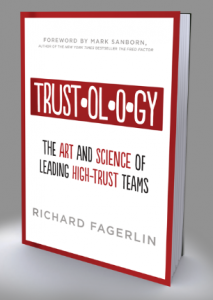 Richard Fagerlin is the author of the new book, Trustology. This is an excellent resource for leaders that will challenge and expand your thinking about this very important topic. I was honored to write the forward. The book launches today and you can find out more here.
Richard Fagerlin is the author of the new book, Trustology. This is an excellent resource for leaders that will challenge and expand your thinking about this very important topic. I was honored to write the forward. The book launches today and you can find out more here.
I do not TRUST YOU!
How many times have you said (or wanted to say) this? You’ve been burned, you’ve been taken advantage of and you’ve given up hope in some cases. Let’s face it, we all want trust but are stingy to give it.
Low trust costs businesses billions of dollars in turnover, disengagement and politics. Personal relationships suffer, organizational health is damaged and consumer confidence is bad in a low trust environment. Research shows that companies with high trust generate over 300 percent greater return than companies with low trust.
Nobody comes into the trust equation empty-handed. We all have strong feelings about trust. We all know what it feels like when it is misused, betrayed, or withheld. Your perspective is from a lifetime of personal experiences, and I believe many of the conclusions that are drawn from those experiences don’t help us. In fact, they are damaging, wrong, and can hold us hostage.
If you have ever been affected by a low-trust relationship, then perhaps it is time for a change in perspective. The best way to change your perspective is to uncover the biggest lie you may believe about trust.
Trust’s big lie: Trust is something that is earned
The Truth on Trust: Trust can’t be earned. It can only be given.
When we are deciding how much to trust people, we usually ask if they have earned our trust. That seems like the smart thing to do. Until they earn it, we withhold it. The problem with this is that none of us are smart enough to build an accurate scorecard to manage this record of “rights” and “wrongs” of trust earned. Imagine if I were able to pull up the scorecard that others are keeping on you. I don’t think any of us would like to see this. When we start keeping score there are only two types of people; winners and losers. In the game of relationships, this only leaves us with losers.
True trust keeps no record of wrongs. Once you’ve made a decision to trust someone, once you’ve decided that winning at that relationship is non-negotiable, you have to stop keeping score.
The first step to building trust is to do just that, take a step. You must surrender your score card and continually take a step to the other person. Let them know what your expectations are and don’t hold them hostage when they don’t meet them. Be willing to forgive. Don’t take things personally. Give them the benefit of the doubt. Take ownership and then… take another step.
If you are to have high trust in your relationships, it starts and ends with you.








